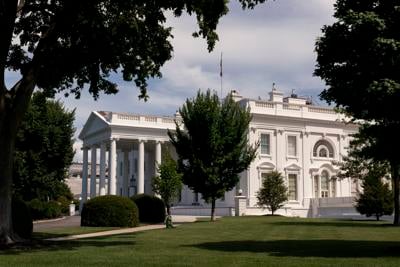WASHINGTON (AP) — A government shutdown fast approaching, Democratic and Republican congressional leaders left a White House meeting with President Donald Trump Monday afternoon showing little willingness to compromise from their entrenched positions in order to avoid a lapse in funding.
If government funding legislation isn't passed by Congress and signed by Trump on Tuesday night, many government offices across the nation will be temporarily shuttered and nonexempt federal employees will be furloughed, adding to the strain on workers and the nation's economy.
But lawmakers were locked in an impasse Monday as Democrats demanded legislation to extend health care benefits and Republicans dared them to vote against legislation that would keep government funding mostly at current levels.
“There are still large differences between us,” Senate Democratic leader Chuck Schumer said as he left the White House.
Vice President JD Vance told reporters after the meeting, “I think we’re headed into a shutdown because the Democrats won’t do the right thing.”
Democrats' health care demands
Trump has shown little interest in entertaining Democrats' demands on health care, even as he agreed to hold a sit-down meeting Monday with Schumer, along with Senate Majority Leader John Thune, House Speaker Mike Johnson and House Democratic leader Hakeem Jeffries. The Republican president has said repeatedly he fully expects the government to enter a shutdown this week.
“If it has to shut down, it’ll have to shut down,” Trump said Friday. “But they’re the ones that are shutting down government.”
The Trump administration has tried to pressure Democratic lawmakers into backing away from their demands, warning that federal employees could be permanently laid off in a funding lapse.
“Chuck Schumer said a few months ago that a government shutdown would be chaotic, harmful and painful. He’s right, and that's why we shouldn't do it,” Thune, a South Dakota Republican, said Sunday on NBC's “Meet the Press.”
Still, Democrats argued Trump's agreement to hold a meeting shows he's feeling the pressure to negotiate. They say that because Republicans control the White House and Congress, Americans will mostly blame them for any government shutdown.
Democrats are pushing for an extension to Affordable Care Act tax credits that have subsidized health insurance for millions of people since the COVID-19 pandemic. The credits, which are designed to expand coverage for low- and middle-income people, are set to expire at the end of the year.
At a Monday news conference, Jeffries, a New York Democrat, called health care cuts a “five-alarm fire” that is rippling across communities nationwide.
“We’re not going to simply go along to get along with a Republican bill that continues to gut the health care of everyday Americans who are already living with this Trump economy, where costs aren’t going down but they’re going up,” he said.
The pandemic-era ACA subsidies are set to expire in a matter of months if Congress fails to act.
Some Republicans are open to extending the tax credits but want changes. Thune said Sunday that the program is “desperately in need of reform” and Republicans want to address “waste, fraud and abuse.” He has pressed Democrats to vote for the funding bill and take up the debate on tax credits later.
How will Democrats vote?
To hold on to their negotiating leverage, Senate Democrats will likely have to vote against a bill to temporarily extend government funding on Tuesday, just hours before a shutdown — an uncomfortable position for a party that has long denounced shutdowns as pointless and destructive.
The bill has already passed the Republican-controlled House and would keep the government funded for seven more weeks while Congress works on annual spending legislation.
Any legislation to fund the government will need support from at least 60 senators in the 100-member chamber. That means that at least eight Democrats would have to vote for the short-term funding bill, because Republican Sen. Rand Paul of Kentucky is expected to vote against it.
During the last potential government shutdown in March, Schumer and nine other Democrats voted to break a filibuster and allow a Republican-led funding bill to advance to a final vote. The New York Democrat faced fierce backlash from many in his own party for that decision, with some even calling for him to step down as Democratic leader.
Senate Democrats have begun to discuss some possible next steps if the government does shut down — potentially a proposal for a one- or two-week stopgap if Republicans will work with them on a health care fix, according to several people familiar with the private talks who requested anonymity to discuss them. But there is no consensus in the caucus about how to proceed, or guarantees that Republicans and Trump would negotiate.
Negotiations between Trump and Democrats
It remains to be seen whether the White House meeting will help or hurt the chances for a resolution. Negotiations between Trump and Democratic congressional leaders have rarely gone well, and Trump has had little contact with the opposing party during his second term.
The most recent negotiation in August between Schumer and the president to speed the pace of Senate confirmation votes for administration officials ended with Trump telling Schumer to “go to hell” in a social media post.
Trump also abruptly canceled a meeting that was planned with congressional leaders last week, calling Democrats' demands “unserious and ridiculous.”
Schumer argued that the White House coming back to reschedule a meeting for Monday showed that “they have felt the heat.”
Associated Press writers Seung Min Kim, Lisa Mascaro and Kevin Freking in Washington contributed.

